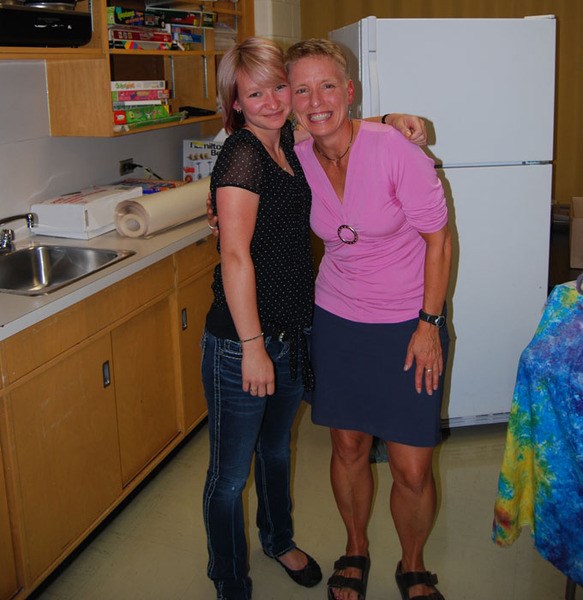In listening to Sylvia Cholodnuik, one can immediately tell she has an epic sense of duty towards the less fortunate, and an amazingly big heart from which she carries it out. On Sept. 12 she spoke to two separate groups of J.H. Kerr students about projects on the African continent that she has been involved with over the past few decades. She spoke of accomplishments and of plans, but more importantly, she spoke of hope. The hope she has for those she serves and the hope they have gained from knowing there are people out there, like Cholodnuik, who genuinely care and offer a hand up.
Although clearly a humanitarian, Cholodnuik refers to herself as an aid project co-ordinator and within her hour-long presentation, she painted a picture of her visits to Zimbabwe that showed a country that she truly loves, but also one in political turmoil and economic flux. She gave the group an overview of the language, the climate, customs, and some of the local geography.
Each time Cholodnuik has visited the area, she has noted enormous monetary swings. One time visiting and finding store shelves bare and a local currency that would seemingly hold more weight on a Monopoly board than in a marketplace (she showed students a ten trillion dollar note that wasn't worth the paper it was printed on). The next visit, the currency being traded was the American dollar, the marketplaces were bustling and stores had an abundance of food and other products on shelves. Within the same visit, she saw inflation tear into the fragile economy once again. Many of the problems can be laid fully at the feet of the country's president, Robert Mugabe, a man who was once seen as a hero, but is now considered an international pariah because of the violence and corruption within his regime.
The most vulnerable people in Zimbabwe are the children; many are orphaned. AIDS has decimated practically every household - one in three people is HIV positive. As a result, the family unit has been laid to waste by this insidious disease and in many cases grandparents are now the new guardians. Cholodnuik says it is a country without a middle age demographic - it has been eradicated by AIDS. So what is left in the balance is where she concentrates: on children and on education.
Cholodnuik has spearheaded numerous projects and been involved in carrying them out over several decades and frequent trips to the country. Included in these is developing a hospital canteen and bakery for a vocational training centre; creating a hospital playroom, which has turned into a rehab centre; refurbishing classrooms in three schools (Tshelanyemba, Mazwi, and Sun Yet Sen), which included building school desks, purchasing textbooks, painting walls, purchasing teacher resource material, school supplies, etc.; building showers and toilets for a hospital kitchen; drilling a well at Sun Yet Sen primary school; replacing deteriorating hospital water tanks; purchasing equipment to begin a market garden for Tshelanyemba primary school; and covering school fees, uniforms, and school supplies for 20 orphan girls.
Cholodnuik grew up on her family's farm outside Meath Park, Sask., where she spent her formative school years. She later graduated with a BSc. in Home Economics from the University of Saskatchewan and a master's degree in leadership and training from Royal Roads University in Victoria. She has travelled extensively on every continent but Antarctica, and elected to return on numerous occasions to Africa. Her connection to Snow Lake is through the J.H. Kerr School Grade 10 student, Erin Sloboda whose father Jim and Cholodnuik are first cousins.
In order to take on all that she does, Cholodnuik fundraises herself, but also works with Rotary and Canadian Food for the Hungry, as well as a wide variety of schools in and around Saskatoon. Coincidentally, Cholodnuik's personal expenses and airfare to Zimbabwe are funded entirely by herself. "People who donate money to me that money all goes to whatever it is I'm doing," she said. "Whether it is paying for the container and getting it shipped over or buying the textbooks in Tshelanyemba or Bulawayo."
Asked what drives her to do what she does, Cholodnuik says, "That's a very good question. It's very complex. I have totally fallen in love with Zimbabwe. I love the people. I see a need and I can make a difference. I could also make a difference here, but everyone has their own niche, my niche is Zimbabwe."
At the conclusion of the talk Cholodnuik said she was pleased with how both J.H. Kerr presentations went and hoped she gave students something to think about. Sloboda, too, noted how happy she was that during both events, students seemed to be engaged and inspired.
It should be noted that Sylvia Cholodnuik does not represent a registered charity. However, she has partnered with Canadian Food for the Hungry for the container project, and they are a registered charity. For those interested in more information or looking to donate, Cholodnuik e-mail address is: scholondnuik@gmail.com




